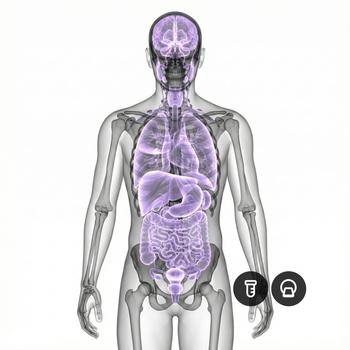What is testosterone?
Testosterone is an important male sex hormone produced in the testes in men and in the ovaries* and adrenal glands in women. Testosterone can also be formed from the conversion of androstenedione in peripheral tissues. Testosterone is transported to a large extent in the blood, bound to SHBG, while a small amount (about 1-2%) is free and therefore biologically active.
Testosterone can be converted to 5alpha-Dihydrotestosterone in the tissues, which is highly biologically active. The effect of testosterone on the body is dependent on the blood levels, the number of androgen receptors and the concentration of the enzyme 5 alpha-reductase in the respective tissue. In adipose tissue, testosterone can be converted to estrogen.
The amount of testosterone is significantly higher in men than women. The hormone has a great importance for the body's muscle structure, skeleton and sex drive. It also helps us to have a good mood and to keep going during, for example, physical activity.
During puberty, the amount of testosterone increases and around the age of 25 it is usually at its highest. After that, testosterone continues to form throughout life in a smaller amount. From the age of about 40, it is common for the amount of testosterone to decrease a little each year.
Why is testosterone analyzed?
Testosterone is analyzed to assess men's production of the important sex hormone. Low levels of testosterone can cause problems such as decreased libido, loss of muscle mass, increased body fat, decreased bone mass, depression and even infertility.
Women's testosterone levels are analyzed to investigate possible hormonal imbalances, which can cause problems with the menstrual cycle, estrogen production, changes in muscle mass and fat distribution, and libido.
Testosterone levels and testosterone secretion
For men, normal testosterone levels are usually higher than 12 nmol/L, while values lower than 8 nmol/L are interpreted as a deficiency. Values between 8-12 nmol/L are considered a gray area.
Testosterone secretion has a strong diurnal variation with a maximum in the morning and a minimum value at midnight.
To get the most accurate assessment possible of testosterone levels in men, a fasting test is recommended, because testosterone levels drop by about 30% one to three hours after a meal in the morning. For women, the cycle day is crucial for assessing testosterone levels, and sampling time and/or fasting are not considered to have any clinical significance.
Symptoms of testosterone deficiency
Testosterone's ability is to help the body be strong and feel that it is at its best. If, for example, you experience problems such as reduced, or no, sex drive, this may be because you have too low a level of testosterone. Here are common symptoms of testosterone deficiency:
- dejection
- impulsivity
- fatigue
- fewer morning erections (men)
- reduced sex drive
- no sex drive
- impotence
- reduced muscle mass
- anger
- easily irritated
- sleeping problems
- increased amount of fat.








































